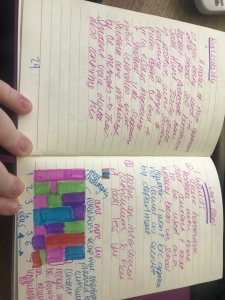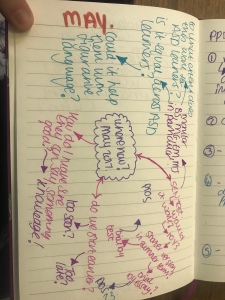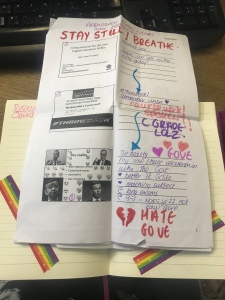One of the biggest changes in the last few years in education is the abolition of national pay scales which teachers automatically progress through. As a result, and combined with government academy policy, schools across the country have vastly different methods, some of which require teachers to jump through crazy hoops for a minor salary increase. This can often mean that teachers are given numerical exam data targets to meet if they want to move up the scale, or it can mean lesson observations at a certain ‘grade’ – a practice which is vastly becoming outdated and generally accepted to show us very little about the quality of teaching, with observers often measuring poor proxies for learning rather than exploring learning over time.
In this context, then, I feel really fortunate to work in a school that is ahead of game in this respect. We dropped formal, graded lessons observations some time ago, and combined this change with a PPD (personal professional development) system of PRP (performance related pay). Our policy is project based, and asks that teachers identify, in around July time, an area of their teaching that they wish to improve, and to go off and try some things to see if they can improve it, followed by exploring the impact of said changes to see if they are worth implementing over time. It is as straightforward as that. In July, we hand in our ‘log’ of what we’ve been up to, which doesn’t have to be in a set format, just show what we’ve been doing. During the course of the academic year, we also check in with our line managers about what we’ve been doing and whether we need some support or guidance to help us move things forward. Throughout the year, we have calendared slots of 1hr 15 mins in which to work on our project. This is something that I think is crucial, to have that time earmarked for the work. There are 6 of these over the academic year. At the end of the cycle, in July, we share our ‘logs’ with SLT and governors and pay decisions are based on this. This year, my log was a purple and silver uniforn notepad, a folder with copies of the research papers I’d read and annotated, plus a copy of my blog post which I wrote following my talk at ResearchEd Oxford about the work I’d done in the last academic year for my PPD. I also included some copies of resources I had made.

Although I jest about the unicorn book, it did enable me to work in the way I work best which is another huge positive for me. You can see here the kind of stuff I had inside:



As well as the obvious love I have for the freedom of the log, there are plenty of other reasons this policy works so well.
First, the emphasis is firmly on teaching and learning, and creating some real, meaningful change to your practice. I remember the head talking when he first launched this policy and saying that having 100 teachers working on 1 improvement is far better than the same 100 working on a box ticking exercise; I couldn’t agree more. The PRP process can sometimes be completely devolved from your day to day teaching, whereas this method encourages us to try new things, read widely and experiment with confidence. For someone who like me, who lives and breathes this kind of thing, it’s heaven! Furthermore, the focus actually isn’t on whether or not the improvement actually works – that’s almost irrelevant in the wider picture. It is about the engagement with, and response to, pedagogy. As long as you’ve engaged with your idea, tried it and worked hard on it, if it doesn’t have an impact, then that’s fine so long as you learn from it.
Secondly, the timings of the policy are important in the wider culture shift. By having the deadline for submission in July, it prevents staff from using exam data and actively encourages us to evidence impact in other ways. This is a real stand out point for me in that it reflects that exam data isn’t always the best measure of teacher quality. The argument behind this is one I empathise with – improved teaching should, in turn, lead to improved learning over time, which will be reflected in whole data any way. It’s too early to tell this on a wider, whole school level, I suspect, but from my own practice, I know I have made some significant changes from which I see impact in the classroom regularly.
And finally, in terms of teacher retention, this policy is, for me, one of the best ways to keep your best teachers in your schools. I have found it completely reinvigorating and I wouldn’t ever now move to a school that did things differently, such as exam data targets and formal, grade lesson observations. The impact on my practice has been significant. For example, during the last academic year, I focussed my project on using cognitive science to address the challenges presented in the new, closed book, English Literature GCSEs. In the end, this became the topic for a talk that I did at ResearchEd Oxford (which I blogged about here), and now a number of colleagues elsewhere have benefitted from the work that I had done as part of my own PPD project. Isn’t that just brilliant? The impact of one decision made in school, to enable our teachers to be creative and free, has led to change for the better in a number of other schools – it makes the alternative, ticking a few boxes for a 4+ headline figure, seem laughable, frankly.
This year, I’ve been working on strategies to make marking more manageable whilst increasing impact and I have some great ideas that will hopefully also benefit colleagues both in school and in the wider teaching community.
I’ve been more than spoilt by seeing how good things can be when schools unleash their teachers in this kind of transformative way and I have no desire at all to return to uninspiring tick boxes which have little bearing on student outcomes.

Love this Amy – sounds like a great place to work. Would you be willing to share a copy of your “log”? I imagine yours is very detailed but would be particularly interested to know how teachers who do not take it so seriously are held accountable.
LikeLike
Hi Adam, I’m just editting the post to include some images and a description of my log. If staff aren’t working well on it, this is flagged up at the line management meetings that we have termly and any concerns about progress or engagement would be brought up there.
LikeLike
Ta 🙂
LikeLiked by 1 person
Pingback: The six best blogs I’ve read this year – A Chemical Orthodoxy